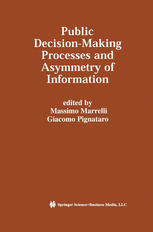

Most ebook files are in PDF format, so you can easily read them using various software such as Foxit Reader or directly on the Google Chrome browser.
Some ebook files are released by publishers in other formats such as .awz, .mobi, .epub, .fb2, etc. You may need to install specific software to read these formats on mobile/PC, such as Calibre.
Please read the tutorial at this link: https://ebookbell.com/faq
We offer FREE conversion to the popular formats you request; however, this may take some time. Therefore, right after payment, please email us, and we will try to provide the service as quickly as possible.
For some exceptional file formats or broken links (if any), please refrain from opening any disputes. Instead, email us first, and we will try to assist within a maximum of 6 hours.
EbookBell Team

0.0
0 reviewsThe problems arising from the existence of asymmetric information in public decision making have been widely explored by economists. Most of the traditional analysis of public sector activities has been reviewed to take accountofthe possible distortions arising from an asymmetric distribution of relevant information among the actors of the public decision-making process. A normative approach has been developed to design incentive schemes which tackle adverse selection and moral hazard problems within public organisations: our understanding of these problems is now much better, and some of the mechanisms designed have had important practical implications. While this analysis is still under way in many fields of public economics, as the papers by Jones and Zanola, and Trimarchi witness, a debate is ongoing on the possible theoretical limitations ofthis approach and on its actual relevance for public sector activities. This book encompasses different contributions to these issues, on both theoretical and practical areas, which were firstly presented at a conference in Catania. The innermost problem in the current discussion arises from the fact that this normative analysis is firmly rooted in the complete contracting framework, with the consequence that, despite the analytical complexities of most models, their results rely on very simplified assumptions. Most complexities of the organisation of public sector, and more generally, of writing "contracts", are therefore swept away.